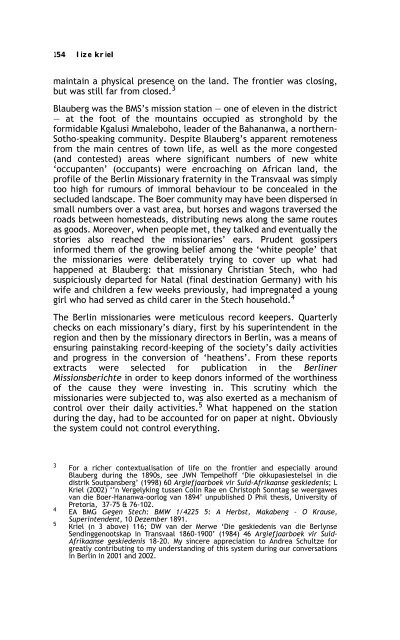Sex, Gender, Becoming - PULP
Sex, Gender, Becoming - PULP
Sex, Gender, Becoming - PULP
You also want an ePaper? Increase the reach of your titles
YUMPU automatically turns print PDFs into web optimized ePapers that Google loves.
154 lize kriel<br />
maintain a physical presence on the land. The frontier was closing,<br />
but was still far from closed. 3<br />
Blauberg was the BMS’s mission station — one of eleven in the district<br />
— at the foot of the mountains occupied as stronghold by the<br />
formidable Kgalusi Mmaleboho, leader of the Bahananwa, a northern-<br />
Sotho-speaking community. Despite Blauberg’s apparent remoteness<br />
from the main centres of town life, as well as the more congested<br />
(and contested) areas where significant numbers of new white<br />
‘occupanten’ (occupants) were encroaching on African land, the<br />
profile of the Berlin Missionary fraternity in the Transvaal was simply<br />
too high for rumours of immoral behaviour to be concealed in the<br />
secluded landscape. The Boer community may have been dispersed in<br />
small numbers over a vast area, but horses and wagons traversed the<br />
roads between homesteads, distributing news along the same routes<br />
as goods. Moreover, when people met, they talked and eventually the<br />
stories also reached the missionaries’ ears. Prudent gossipers<br />
informed them of the growing belief among the ‘white people’ that<br />
the missionaries were deliberately trying to cover up what had<br />
happened at Blauberg: that missionary Christian Stech, who had<br />
suspiciously departed for Natal (final destination Germany) with his<br />
wife and children a few weeks previously, had impregnated a young<br />
girl who had served as child carer in the Stech household. 4<br />
The Berlin missionaries were meticulous record keepers. Quarterly<br />
checks on each missionary’s diary, first by his superintendent in the<br />
region and then by the missionary directors in Berlin, was a means of<br />
ensuring painstaking record-keeping of the society’s daily activities<br />
and progress in the conversion of ‘heathens’. From these reports<br />
extracts were selected for publication in the Berliner<br />
Missionsberichte in order to keep donors informed of the worthiness<br />
of the cause they were investing in. This scrutiny which the<br />
missionaries were subjected to, was also exerted as a mechanism of<br />
control over their daily activities. 5 What happened on the station<br />
during the day, had to be accounted for on paper at night. Obviously<br />
the system could not control everything.<br />
3 For a richer contextualisation of life on the frontier and especially around<br />
Blauberg during the 1890s, see JWN Tempelhoff ‘Die okkupasiestelsel in die<br />
distrik Soutpansberg’ (1998) 60 Argiefjaarboek vir Suid-Afrikaanse geskiedenis; L<br />
Kriel (2002) ‘’n Vergelyking tussen Colin Rae en Christoph Sonntag se weergawes<br />
van die Boer-Hananwa-oorlog van 1894’ unpublished D Phil thesis, University of<br />
Pretoria, 37-75 & 76-102.<br />
4 EA BMG Gegen Stech: BMW 1/4225 5: A Herbst, Makabeng – O Krause,<br />
Superintendent, 10 Dezember 1891.<br />
5<br />
Kriel (n 3 above) 116; DW van der Merwe ‘Die geskiedenis van die Berlynse<br />
Sendinggenootskap in Transvaal 1860-1900’ (1984) 46 Argiefjaarboek vir Suid-<br />
Afrikaanse geskiedenis 18-20. My sincere appreciation to Andrea Schultze for<br />
greatly contributing to my understanding of this system during our conversations<br />
in Berlin in 2001 and 2002.
















